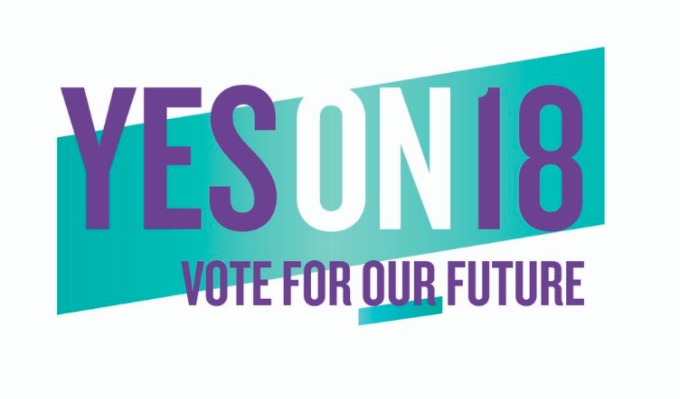This year marks the first time California voters are able to decide whether 17 year olds should be able to vote in special and primary elections — if they will be 18 by the general election. It’s not a new idea. According to Calmatters, lawmakers have considered this option for many years. I had my reservations at first, but it seems reasonable to me that first-time voters on the cusp of adulthood should “be afforded the opportunity to shape the choices that appear on the general election ballot” through their participation in the primary. If Prop. 18 passes, California would join 19 other states and Washington, D.C., in allowing teens of age to vote in a November general election.
There are opponents who have cited 17 year olds’ general “lack of life experience” as a reason to deny them the right to vote, but I would argue that their particular set of life experiences are precisely why their voices ought to be taken into account. Not only does the “no life experience” mindset eliminate what young people bring to the table, it also neglects the myriad ways teens are impacted by policies in which they have no say. While there’s much to learn from actions taken by older generations, there is also much to be learned from their inaction.
In recent years, young activists have held demonstrations and walkouts over climate change, ethnic studies, gun violence, and racial injustice. They’ve created book clubs amplifying underrepresented voices. They’ve led initiatives to feed the homeless and provide clean drinking water. Most impressively, they have shown on more than one occasion their ability to take a localized issue concerning the most vulnerable members of their communities and catapult it into the national spotlight.
Why a “yes” vote on Prop. 18 is warranted, here are some U.S. teens who’ve demonstrated that voting is the bare minimum of what each of us could be doing and that our age doesn’t disqualify us from making an impact.
Mari Copeny
At the age of 8, Mari Copeny, more widely known as Little Miss Flint, wrote a letter to President Obama encouraging him to see the devastating effects of the water crisis in her hometown of Flint, Michigan, with his own eyes. She has since raised over half a million dollars for her Flint Kids project which provides local school children with school supplies, Christmas gifts, and, of course, clean water. Not only does she continue to cultivate awareness about environmental racism and neglectful leadership, she is also involved in 18 x Eighteen, an initiative that encourages young people to go out and vote once they become of age. Mari won’t be able to vote for the next several years as she is currently 13 years old, but she is planning on running for President of the United States once she is eligible.
(Flint still doesn’t have clean water, by the way.)
Emma Gonzalez
Emma Gonzalez first drew attention with her “We Call BS” speech calling out NRA-backed politicians in the aftermath of the school shooting in Parkland, Florida; but it was an interview of hers that cemented her in my memory. That very same day, when speaking with a local newscaster, she pledged right then and there to take whichever measures necessary to ensure nothing like this ever happened again. I remember the newscaster’s surprise over somebody that young being able to articulate their purpose with such conviction.
Gonzalez quickly became a leading voice in March for Our Lives. One month after the shooting, the student-led demonstration in D.C., as well as more than 800 separate demonstrations throughout the country, took place with an estimated turnout between 1.2 million to 2 million. During this demonstration, Gonzalez gave another speech where she read the names of the deceased and included a long moment of silence wherein she notably marked the 6 minutes and 20 seconds it took for the gunman to claim those 17 lives. Thanks to Gonzalez and everyone involved in March for Our Lives, they increased youth voter turnout by 47 percent in the 2018 midterms and a whopping 46 NRA-backed candidates lost their elections.
Xiuhtezcatl Martinez
Activist. Musician. Philanthropist. Skilled code switcher.
Xiuhtezcatl first came into the spotlight at age 6, when he recited a prayer in his native language giving thanks to the elements in the opening remarks of his first climate event. In this speech he not only listed small, everyday actions we can take, but he also commented on the correlation between consumerism and our aching planet.
Martinez not only gave three Ted Talks in his teens, but in 2015 he was invited to speak before the United Nations urging them to take immediate action regarding climate change. Martinez’s work proves that activism can also be intergenerational. His mother, Tamara Roske, founded the environmental action organization Earth Guardians in 1992, of which he is now the Youth Director. Promoting social justice through storytelling, music and art as tools of resistance and community, Earth Guardians teaches and is centered on how we can be leaders starting at an early age.
Copeny, Gonzalez, and Martinez are just a few notable faces among the rising number of today’s young activists, voters, and future voters. They may vary in struggles and life experiences, but they ultimately share the same goal: a brighter future.
Let’s show up for them this November. Vote yes on Prop. 18.

